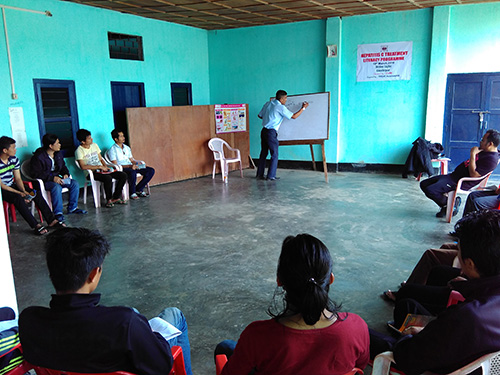In April 2016, the Community Network for Empowerment (CoNE) in Manipur, India, a network of community-based organizations of people who use drugs and a partner of TREAT Asia, was selected as one of the top five organizations in the Global Hepatitis Innovation Testing Contest. The contest was conducted by the World Health Organization (WHO) and Social Entrepreneurship for Sexual Health (SESH). SESH is a multi-sectoral collaboration led by the Guangdong Provincial STD Control Center and the University of North Carolina–Project China. The main goal of SESH is to create more engaging and effective sexual health services using crowdsourcing and other social entrepreneurship tools.

One of the community treatment literacy programs in progress
Manipur is a small border state in northeast India bordering Myanmar. Studies have reported a prevalence of hepatitis C infection of up to 98% among people who inject drugs in certain districts of the state. Yet, because of constrained resources, it is extremely difficult to access hepatitis C testing, diagnosis, and treatment. The result is that people living with HIV and hepatitis C co-infection are dying more frequently from hepatitis-C-related complications than from HIV-related complications.
CoNE’s advocacy work to address the high rate of hepatitis C in the area included a comprehensive testing model under a novel public-private partnership model that linked patients from testing to treatment with direct-acting antivirals (DAAs). Rajkumar Nalinikanta, president of CoNE, stated, “We started this campaign along with the department of health to show that we indeed have a huge problem with hepatitis C which is undocumented and not reflected in government data.”
CoNE initially approached the state’s Department of Health to collaborate on conducting a testing campaign in all nine of their districts among people living with HIV, those who inject drugs, general hospital clinic patients, and clients of opiate substitution centers. The department agreed and contributed space in the district hospitals, doctors, nurses, and blood storage facilities, while CoNE mobilized community members and patients to enroll for testing. A generic pharmaceutical company provided the rapid testing antibody kits. Positive screening tests were further confirmed by the Indian Council of Medical Research’s Virology Unit with a hepatitis C viral load test, and liver fibrosis was assessed using a special ultrasound machine (FibroScan®). People who wanted to receive treatment were linked to physicians for further evaluation.
During the initial screening phase of the campaign in October and November of 2014, 1,011 participants were tested for hepatitis C with the rapid testing method; 494 (49%) tested positive. Of these, 463 (94%) were later confirmed to have chronic hepatitis C infection. CoNE negotiates preferential pricing with generic pharmaceutical companies and currently reports the cost for a 12-week, all-DAA regimen to be ~580 USD. While prohibitively expensive for many people, it is substantially reduced from the cost in other countries.
As of March 2016, 38 patients in this program have accessed treatment. CoNE continues to advocate to persuade the state government to include DAAs in its health assistance fund’s drug formulary lists, which would expand treatment options for more of those in need.
As a result of being selected through the Global Hepatitis Innovation Testing Contest, CoNE was invited to present its comprehensive testing and linkage to care model at the International Liver Congress in Barcelona in April, and its work will be featured in the upcoming WHO hepatitis B and C testing guidelines, scheduled to be released later this year.
"We are humbled and honored with such a recognition and will continue to work on improving access to hepatitis testing and treatment in our state and beyond. We are thankful for the technical support that TREAT Asia provided in the entire process. It shows that community groups can play an effective role in testing and linking people to treatment with the best of the new medications,” said Mr. Nalinikanta.